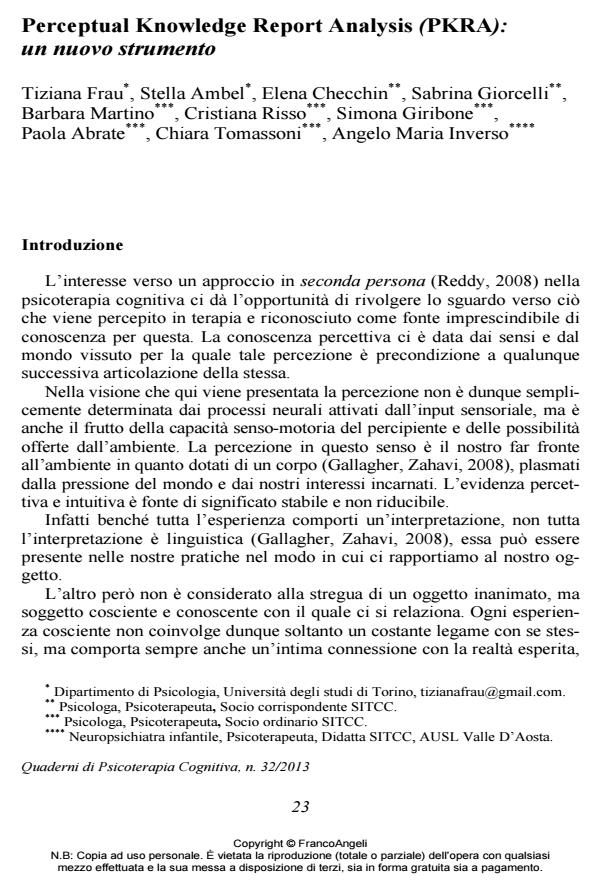Perceptual Knowledge Report Analysis (PKRA): A new instrument
Journal title QUADERNI DI PSICOTERAPIA COGNITIVA
Author/s Tiziana Frau, Stella Ambel, Elena Checchin, Sabrina Giorcelli, Barbara Martino, Cristiana Risso, Simona Giribone, Paola Abrate, Chiara Tomassoni, Angelo Maria Inverso
Publishing Year 2013 Issue 2013/32 Language Italian
Pages 22 P. 23-44 File size 518 KB
DOI 10.3280/QPC2013-032003
DOI is like a bar code for intellectual property: to have more infomation
click here
Below, you can see the article first page
If you want to buy this article in PDF format, you can do it, following the instructions to buy download credits

FrancoAngeli is member of Publishers International Linking Association, Inc (PILA), a not-for-profit association which run the CrossRef service enabling links to and from online scholarly content.
The PKRA (Perceptual Knowledge Report Analysis) is a new tool for coding reports of sessions of psychotherapy. By identifying some linguistic markers, it is possible to bring out the different types of information sources that the psychotherapist uses when recalling the relational experience with the patient. These information sources can traced back to a cognitive mode based either on the emotional resonance or the first person, on mentalization or third person (Bara, 2007), and the direct perception or second person (Reddy, 2008). The reports were written immediately after the end of the sessions to preserve the mood of what has happened, and present the episodic of the sessions to the extent possible free from semantisation. In particular, a grid which considers the possible attributions to the first, second and third person has been created ad hoc. The reports were later evaluated, in a blinded fashion by three independent judges, and the results show that the instrument is reliable for all three categories of coding. Furthermore, the reports of developmental age psychotherapists compared to the reports of adult age psychotherapists, show a prevalence of the second person mode compared to those in first and third person, which appear to be used only when second person mode is not sufficiently comprehensive. In conclusion, this work discuss the importance of perceptual knowledge for understanding the therapeutic relationship, diagnosis, in the psychotherapeutic process.
Keywords: Perceptual knowledge, tuning, psychotherapy, report
- Bara B.G. (2007). Dinamica del cambiamento e del non cambiamento. Torino: Bollati Boringhieri.
- Bara B.G., a cura di (2005), Nuovo Manuale di Psicoterapia Cognitiva, volume 1: Teoria. Torino: Bollati Boringhieri.
- Baron-Cohen S. (1995). L’Autismo e la lettura della mente. Roma: Astrolabio.
- Carruthers P. (1998). Natural Theories of consciousness. European Journal of Philosophy, 6/2: 203-222. DOI: 10.1111/1468-0378.0005
- Cionini L., Ranfagni C. (2009). Dire, fare, imparare: un modello di formazione alla psicoterapia in ottica cognitivo-costruttivista. Rivista di Psicologia Clinica, 2: 42-62.
- Gallagher S., Zahavi D. (2008). The Phenomenological Mind: An Introduction to Philosophy of Mind and Cognitive Science. New York: Routledge.
- Gallese V. (2005). Being Like Me: Self-Other Identity, Mirror Neurons and Empathy. In S. Hurley, N. Chater (eds.), Perspective on Imitation, from Neuroscience to Social Science, Volume 2. Cambridge: MIT Press.
- Gallese V., Lakoff G. (2005). The Brain’s concepts: The role of sensory-motor system in conceptual knowledge. Cognitive Neuropsychology, 21: 1-25. DOI: 10.1080/0264329044200031
- Goldman A.I. (2005). Imitation, mind reading, and simulation. In S. Hurley, N. Chater (eds.), Perspective on Imitation, from Neuroscience to Social Science, Volume 2. Cambridge: MIT Press.
- Gopnik A., Meltzoff A. (1997). Words, Thoughts, and Theories. Cambridge, M.A.: MIT Press. Gordon R.M. (2005). Intentional Agents Like Myself. In S. Hurley, N. Chater (eds.), Perspective on Imitation, from Neuroscience to Social Science, Volume 2. Cambridge: MIT Press.
- Guidano V.F. (1987). La complessità del sé. Un approccio sistemico-processuale alla psicopatologia e alla terapia cognitiva. Torino: Bollati Boringhieri.
- Guidano V.F. (1992). Il Sé nel suo divenire. Verso una terapia cognitiva post-razionalista. Torino: Bollati Boringhieri.
- Liotti G. (2001). Le opere della coscienza. Psicopatologia e psicoterapia nella prospettiva cognitivo-evoluzionistica. Milano: Raffaello Cortina.
- Merleau-Ponty M. (1945). Phénoménologie de la perception. Paris: Gallimard (trad. it. Bonomi A. Fenomenologia della percezione. Milano: Il Saggiatore, 1965).
- Morin E. (1986). La méthode. III: La connaissance de la connaissance. Paris: Seuil (trad. it. La conoscenza della conoscenza. Milano: Feltrinelli, 2007).
- Noë A. (2009). Out of Our Heads: Why You Are Not Your Brain, and Other Lessons From the Biology of Consciousness. New York: Hill & Wang.
- Reda M.A. (1986). Sistemi cognitivi complessi e psicoterapia. Roma: La Nuova Italia Scientifica.
- Reda M.A. (2005). L’organizzazione della conoscenza. In B.G. Bara, a cura di, Nuovo manuale di psicoterapia cognitiva volume 1: Teoria. Torino: Bollati Boringhieri. Tiziana Frau et al. 44
- Reddy V. (2008). How Infants Knows Minds. Cambridge, MA: Harvard University Press.
- Scheler M. (1954). The Nature of Sympathy, Peter Heath (New Haven: Yale University Press).
- Stern D. (2004). The Present Moment in Psychotherapy and Everyday Life. New York: Norton.
- Tronick E.Z. (2002). A model of infant mood states: Long lasting organizing affective states and emotional representational processes. Psychoanal. Dial., 12: 73-99.
- Tronick E.Z. (2008). Regolazione emotiva: nello sviluppo e nel processo terapeutico. A cura di Cristina Riva Crugnola e Carlo Rodini. Milano: Raffaello Cortina.
- Wellmann H.M., Cross D., Watson J. (2001). Meta-analysis of theory-of-mind development: The truth about false belief. Child Development, 72: 655-684. DOI: 10.1111/1467-8624.0030
- Prototipi clinici di ritirati sociali. Un approccio in seconda persona alla diagnosi Angelo Maria Inverso, Tiziana Frau, Elena Checchin, Alessia Minellono, in PSICOBIETTIVO 2/2022 pp.141
DOI: 10.3280/PSOB2022-002012
Tiziana Frau, Stella Ambel, Elena Checchin, Sabrina Giorcelli, Barbara Martino, Cristiana Risso, Simona Giribone, Paola Abrate, Chiara Tomassoni, Angelo Maria Inverso, Perceptual Knowledge Report Analysis (PKRA): un nuovo strumento in "QUADERNI DI PSICOTERAPIA COGNITIVA" 32/2013, pp 23-44, DOI: 10.3280/QPC2013-032003